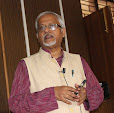
Nobel Physicist Dr. Martin L. Perl said that sound health, dedication, good colleagues and friends are necessary to be progress in one’s field. Basic and applied researches are equal and have great significance, he said.
CJ: Arindam Roy , 19 Dec 2008 Views:1737 Comments:0
ON THE fifth day (Friday, Dec 19) of the country’s first Science Conclave, at the Indian Institute of Information Technology-Allahabad (IIIT-A), several activities kept the participants busy throughout the day.
In the morning, an open panel discussion comprising of Prof Martin L Perl, Prof Harold (Harry) Walter Kroto, Prof Jerome Issac Friedman, Prof DN Talwar, Dr M D Tiwari, Prof GC Nandi, Prof Radhakrishna and Prof US Tiwari was organised in the huge pandal which discussed upon several aspects of science education in the world.
The panel members concluded that science and research can only be motivated with the help of all social classes, government, industries and educational institutions. The panel members replied a volley of questions asked by students and teachers present in the pandal.
Later, addressing the students Nobel Physicist Dr. Martin L. Perl said that sound health, dedication, good colleagues and friends are necessary to be progress in one’s field.
During the interactive session with students he enlisted these three things as important to keep going with one’s work.
He put forward some of the famous questions related to astronomical sciences like the possibility of life on other planets, whether space is curve or flat, etc and looking for newer methods to investigate into these areas, as he believed that the “young see the things better”.
Prof Perl said that the important thing in research is that you should never take any argument personally, on yourself. He emphasised on the fact that every research converges to give a proper result and the result should be such that it should be mutually agreed upon by everyone.
On being asked that how did he chose his field, he said that he was obsessed with the elementary particles of atom and also discussed about his perception of the Big Bang theory, the black hole, the new concept of “antigravity”, relative stability of elementary particles.
When asked that what other fields he would select if he has given an opportunity once again, he said that he would like to do research on medical sciences, specially brain and the nerve sensing.
Prof Perl also discussed his education till high school, his inclination of becoming a successful engineer to do some ‘interesting things’ and how he turned toward sciences on the suggestion of his professor that exploring sciences would be much ‘more interesting’. He also spoke about the availability of resources at that time in the US due to threat of Russian technologies.
He also dealt on religion, as it is the way of life and doing charity to help the poor is the best way of life, when asked about any religion constraints he had to face .There was a lot of discussion about the ethical issues hampering researches to which Dr. Mishra answered that researches must go on if it is in benefit of mankind.
Prof Perl also answered a query related to basic research and applied research, stating that both these are equal and have great significance.
He ended the session reiterating the effect that one should work in the areas of one’s interest and enjoy it to have the best output, and the work atmosphere should be full of good friends such that everyone is happy working together with due to respect for each and every person.
The mathematics department continued attracting a large number of students in the Science Conclave for attending the interactive session with Noble laureates. Prof Jerome Isaac Friedman answered the queries of the students. He was ready to enhance their knowledge.
Prof. Friedman inspired the students by telling them about his high school life and by informing how he got interested in Physics after reading a book on theory of relativity by Sir Albert Einstein. He asked the students to develop an interest in the field of science and enjoy the work which they do because this will give them the true satisfaction, even greater satisfaction than winning a Nobel Prize.
He also urged the students to enhance their knowledge about humanity because it is better to become a good human being first and a scientist later. For the students, who will form the future of the world, his message was to keep their mind open, to be ready to take risks and also not only to think about the problem but also the solutions to these problems.
Students asked their queries, which Prof Friedman answered, readily. There were questions relating to importance of mathematics and he answered by explaining the use of mathematics in every field of science, like physics, chemistry and biology. Especially for physics he said that both go hand in hand and without mathematics there would not be any development in modern physics.
He said that everything in mathematics represents something in the physical world but these are our constraints that we are able to understand only a few amongst them. Then there were many questions related to Hadron Collider, atomic clocks and also about the work related to the discovery of quarks and he took a great delight answering these queries.
( http://www.merinews.com/catFull.jsp?articleID=154021 )















